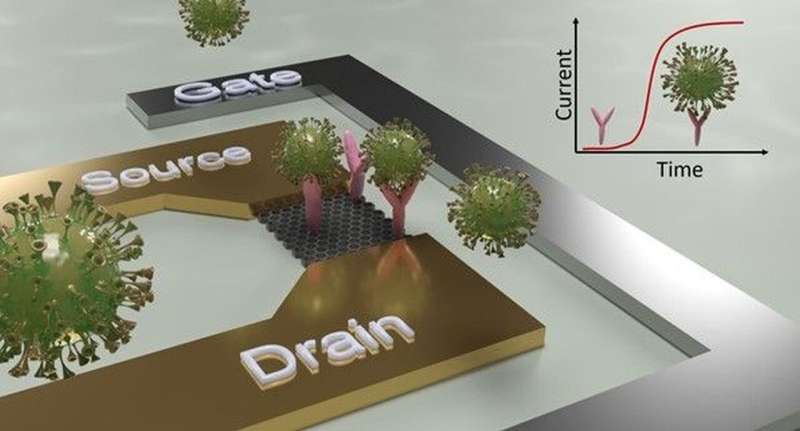This article has been reviewed according to Science X's editorial process and policies. Editors have highlighted the following attributes while ensuring the content's credibility:
fact-checked
peer-reviewed publication
trusted source
proofread
Customizing nanoelectronic sensors for the detection of viral antigens

The outbreak of the COVID pandemic in 2020 has once again shown how important reliable and rapid detection methods are to initiate effective measures to combat a pandemic. Scientists from the Chair of Materials Science and Nanotechnology at TU Dresden (TUD) have made considerable progress in the development of highly innovative solutions for the detection of viral pathogens in two studies they presented recently.
The results of their work have now been published in the journals ACS Applied Materials & Interfaces and Advanced Materials Interfaces.
Customized, powerful and adaptable nanoelectronic sensors represent a promising approach to fighting both current and future pandemics. These sensors not only enable conventional diagnosis in cases of suspected outbreaks, but also a continuous monitoring of ambient air in buses, trains, schools or health care facilities. This means that appropriate and immediate measures can be taken as soon viruses appear.
Since 2020, the Dresden scientists have been working intensively on the development of miniaturized sensors for the accurate and efficient detection of SARS-CoV-2 antigens. In addition to the TUD team led by Prof. Gianaurelio Cuniberti and Dr. Bergoi Ibarlucea, scientists from the European Molecular Biology Laboratory (EMBL) in Hamburg, the Leibniz Institute of Polymer Research (IPF) Dresden and the Pohang University of Science and Technology (POSTECH) in Korea were also involved in the two studies.
Sybodies: A revolution in biological recognition
The first study, published in the journal ACS Applied Materials & Interfaces, describes a groundbreaking innovative approach that significantly increases accuracy and speed of SARS-CoV-2 antigen detection. It involves inserting synthetic nanobodies, known as sybodies, into biosensors as receptors.
"Sybodies represent a rapid, sustainable and ethically sound alternative that, unlike conventional antibodies, is developed and manufactured using non-animal methods," said Prof. Gianaurelio Cuniberti, who coordinated both studies with Dr. Bergoi Ibarlucea.
"Another key advantage of using sybodies is their smaller size compared to antibodies, so biological recognition processes can take place much closer to the sensor surface, increasing signal strength and making the sensors much faster and more sensitive," he adds. Initial tests have been successfully conducted with silicon nanowire-based field-effect transistors modified with sybodies, demonstrating the great application potential of this approach.
Overcoming the loss of sensitivity in biological fluids
In the second paper, published in the journal Advanced Materials Interfaces, the team investigated the increasing the sensitivity of the sensors when they operate in biological fluids. Such samples have a complex molecular composition, which severely limits the sensor's detection range.
To solve this problem, the scientists developed a special surface modification with a hydrogel based on the dielectric polymer polyethylene glycol. This allows measurements to be taken directly in saliva and other samples from patients, and eliminates the need for time-consuming and costly sample preparation steps.
More information: Chi Zhang et al, Sybodies as Novel Bioreceptors toward Field-Effect Transistor-Based Detection of SARS-CoV-2 Antigens, ACS Applied Materials & Interfaces (2023). DOI: 10.1021/acsami.3c06073
Alexandra Parichenko et al, Hydrogel‐Gated Silicon Nanotransistors for SARS‐CoV‐2 Antigen Detection in Physiological Ionic Strength, Advanced Materials Interfaces (2023). DOI: 10.1002/admi.202300391
Journal information: ACS Applied Materials and Interfaces
Provided by Dresden University of Technology





















